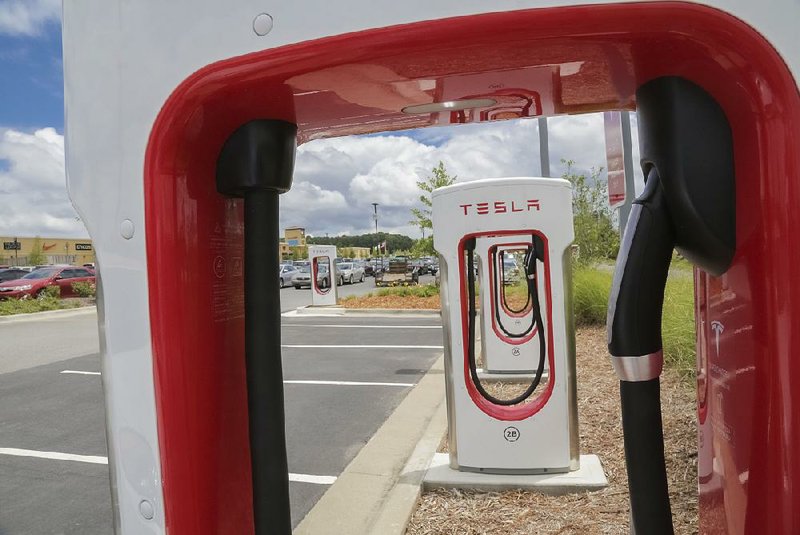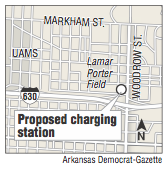The Little Rock Board of Directors this week will decide whether a developer can sell electricity to power vehicles at a site off Interstate 630. The city's staff and its planning commissioners have reached opposing recommendations on the charging station.
Jeff Franklin of Little Rock has proposed opening the solar-covered charging station with at least three quick-charge plug-ins, something that's scarce in Arkansas. The station would sit outside Franklin's planned farm-to-table restaurant made of shipping containers at the South Woodrow Street exit.
A new Arkansas law allows Franklin to sell electricity for cars, but his proposal must first clear a local land-use hurdle.
The city's Planning Commission in June signed off on Franklin's request to zone vacant property for commercial use, but city employees are recommending that city directors maintain the half-acre lot for residential use because they view South Woodrow Street as the dividing line between homes and businesses.
The Capitol View-Stifft Station Neighborhood Association -- whose president, Danielle Ray, called the idea a "perfect fit for the culture and feel of our neighborhood" -- backs the development.
City directors have the final say on zoning issues and on Tuesday placed the item on the agenda for their 6 p.m. meeting this Wednesday at City Hall.
Central Arkansas has 16 charging stations, not including home plug-ins, according to PlugShare, a company that maintains a map-based database of such stations. Only one, a Tesla Supercharger at the Outlet Mall of Little Rock, provides the type of quick charge that Franklin proposes. Quick charge provides more than 150 miles' worth of electricity in a half-hour.
Franklin said he hopes the $750,000 investment will coincide with a surge in electric-vehicle use and be the springboard for establishing other stations under a unified brand.
Across the state, 443 vehicles are registered as fully electric-powered, said Jake Bleed, a spokesman for the Arkansas Department of Finance and Administration.
An additional 16,731 are registered as gas-electric hybrids, but it's not clear how many of them require plug-ins to obtain their charges, Bleed said.
"As far as the Little Rock market goes, sometimes we're a little late to catch on to trends like that," Franklin said.
Before Arkansas' new law, the state required a business to qualify as a utility regulated by the Public Service Commission before selling electricity for vehicles.
Gov. Asa Hutchinson in March signed into law Act 285 of 2017, which exempted car-charging stations from the definition of a utility as set by a 1935 law. Tesla began building its super-charger station a month later, and a fast-charge station has opened in Rogers, according to PlugShare.
State Rep. Warwick Sabin, D-Little Rock, who co-sponsored the legislation with Sen. Cecile Bledsoe, R-Rogers, said it was not realistic to regulate car-charging stations in the same way major utility companies are regulated. Utility firms must get approval every time they change their rates, for instance.
"It would be like treating a mom-and-pop business as if they were a major government entity or corporation," Sabin said. "It was a business impediment. It was a tourism impediment. It was an economic development impediment for the state."
Before the Tesla station opened, Arkansas was a "doughnut hole" in the national network of quick-charge stations, leading long-distance drivers to bypass the state when mapping their routes, Sabin said. Other stations, such as one at the Clinton Presidential Center, offer free hookups but slower charging.
"The charging stations that existed previously were, in essence, goodwill gestures set up by either municipalities or other organizations that wanted to have that amenity on their site," Sabin said. "They definitely didn't provide a strong enough charge for people who travel seriously across the country and who expect to arrive somewhere, get a good charge and continue traveling."
Franklin also is meeting with Arkansas farms and food cooperatives to build a network to supply his 1,500-square-foot restaurant, which will be the primary revenue generator for the first five years, he said.
Little Rock's Planning and Zoning Department in its analysis discourages the zoning change because the west side of Woodrow Street has historically been residential.
"We're concerned about encroachment of nonresidential zoning into this neighborhood," Planning Director Tony Bozynski said.
The Planning Commission, made up of board appointees, voted 10-1 to recommend that city directors approve the change after listening to Franklin and Ray, the neighborhood association president.
"I can't find anything not to like about this one," Commissioner Paul Latture said.
Commissioner Troy Baha, who voted against the proposal, said the presentation didn't sway him.
"I was opposed to it before you started your spiel," Baha said. "I don't think we need an electric charging station down there, myself."
The grassy lot, near a power substation, has been vacant for at least 10 years, Ray said.
"It's kind of an eyesore for the neighborhood and that spot," Ray said of the substation. "The project he has planned would essentially block a lot of that from view. I think it's a really smart design."
Ray likened Franklin's proposal, which would sit at the neighborhood's I-630 entrance, to unique local restaurants like Pizza D'Action and The Oyster Bar.
"I think it sets the tone for the neighborhood," Ray said.
Metro on 07/02/2017


